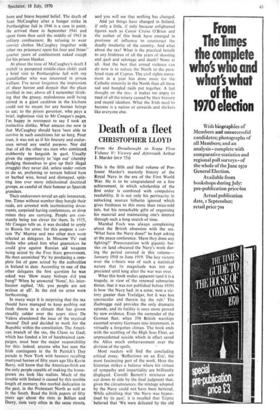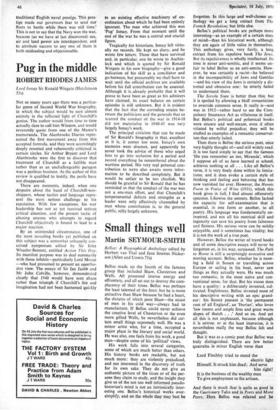Death of a fleet
CHRISTOPHER LLOYD
From the Dreachzought to Scapa Flow Volume V: Victory and Aftermath Arthur J. Mardei (our 75s) This is the fifth and final volume of Pro- fessor Marder's masterly history of the Royal Navy in the era of the First World War. He is to be congratulated on a fine achievement, in which scholarship of the first order is combined with compulsive readability. It is not only his pertinacity in unlocking sources hitherto ignored which gives freshness to this more than twice-told tale, but his remarkable gifts of organising his material and maintaining one's interest through such a long stretch of time.
Marshal Foch was always complaining about the British obsession with the sea. `What have the Navy done?' he kept asking at the peace conference. 'Have they done any fighting?' Preoccupation with gigantic bat- tles on land obscured the Navy's work dur- ing the period covered in this volume— January 1918 to June 1919. The key victory over the u-boats was of such a statistical nature that its magnitude was not ap- preciated until long after the war was over.
What this book makes apparent (and it is a tragedy, in view of The renewed submarine threat, that it was not published before 1939) is how 'the Navy had, in a sense, won a vic- tory greater than Trafalgar, but it was less spectacular and therein lay the rub.' The Zeebrugge raid provides the only dramatic episode, and its futility is once more proved by new evidence. Even the surrender of the German fleet, when 370 British warships escorted seventy Germans into internment, is virtually a forgotten climax. The book ends with the scuttling of the High Seas Fleet, an unprecedented suicide which in effect saved the Allies much embarrassment over the division of the spoils.
Most readers will find the concluding critical essay, 'Reflections on an Era', the most fascinating part of the work. Here the historian strikes a balance where his virtues of sympathy and impartiality are brilliantly displayed. Correlli Bamett's strictures are cut down to side by the final judgment that, given the circumstances, the strategy adopted by the Navy could not have been bettered. While admitting that 'the Navy was hypno- tised by its past', it is recalled that Tirpitz 'believed that 'We were defeated by the old traditional English naval prestige. This pres- tige made our governors fear to send our fleets to battle while there was still time.' This is not to say that the Navy won the war, because (as we have at last discovered) sea, air and land power are interdependent, and to attribute success to any one of them is both misleading and objectionable.























































 Previous page
Previous page